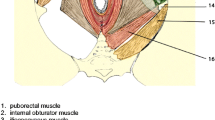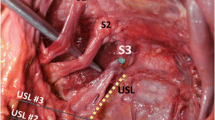Abstract
The objective of this work was to collect and summarize relevant literature on the anatomy, histology, and imaging of apical support of the upper vagina and the uterus provided by the cardinal (CL) and uterosacral (USL) ligaments. A literature search in English, French, and German languages was carried out with the keywords apical support, cardinal ligament, transverse cervical ligament, Mackenrodt ligament, parametrium, paracervix, retinaculum uteri, web, uterosacral ligament, and sacrouterine ligament in the PubMed database. Other relevant journal and textbook articles were sought by retrieving references cited in previous PubMed articles. Fifty references were examined in peer-reviewed journals and textbooks. The USL extends from the S2 to the S4 vertebra region to the dorsal margin of the uterine cervix and/or to the upper third of the posterior vaginal wall. It has a superficial and deep component. Autonomous nerve fibers are a major constituent of the deep USL. CL is defined as a perivascular sheath with a proximal insertion around the origin of the internal iliac artery and a distal insertion on the cervix and/or vagina. It is divided into a cranial (vascular) and a caudal (neural) portions. Histologically, it contains mainly vessels, with no distinct band of connective tissue. Both the deep USL and the caudal CL are closely related to the inferior hypogastric plexus. USL and CL are visceral ligaments, with mesentery-like structures containing vessels, nerves, connective tissue, and adipose tissue.






Similar content being viewed by others
Abbreviations
- CL:
-
Cardinal ligament
- USL:
-
Uterosacral ligament
- POP:
-
Pelvic organ prolapse
- IHP:
-
Inferior hypogastric plexus or pelvic plexus
- MR:
-
Magnetic resonance
- CT:
-
Computed tomography
References
DeLancey JO (1992) Anatomic aspects of vaginal eversion after hysterectomy. Am J Obstet Gynecol 166:1717–1724
Rooney K, Kenton K, Mueller ER, FitzGerald MP, Brubaker L (2006) Advanced anterior vaginal wall prolapse is highly correlated with apical prolapse. Am J Obstet Gynecol 195:1837–1840
Summers A, Winkel LA, Hussain HK, DeLancey JO (2006) The relationship between anterior and apical compartment support. Am J Obstet Gynecol 194:1438–1443
Hendrix SL, Clark A, Nygaard I, Aragaki A, Barnabei V, McTiernan A (2002) Pelvic organ prolapse in Women’s Health Initiative: gravity and gravidity. Am J Obstet Gynecol 186:1160–1166
Fialkow MF, Newton KM, Weiss NS (2008) Incidence of recurrent pelvic organ prolapse 10 years following primary surgical management: a retrospective cohort study. Int Urogynecol J Pelvic Floor Dysfunct 19:1483–1487
Tunn R, DeLancey JO, Quint EE (2001) Visibility of pelvic organ support system structures in magnetic resonance images without an endovaginal coil. Am J Obstet Gynecol 184:1156–1163
Umek WH, Morgan DM, Ashton-Miller JA, DeLancey JO (2004) Quantitative analysis of uterosacral ligament origin and insertion points by magnetic resonance imaging. Obstet Gynecol 103:447–451
Butler-Manuel SA, Buttery LD, A'Hern RP, Polak JM, Barton DP (2000) Pelvic nerve plexus trauma at radical hysterectomy and simple hysterectomy: the nerve content of the uterine supporting ligaments. Cancer 89:834–841
Blaisdell FE (1917) The anatomy of the sacrouterine ligaments. Anat Rec 12:22
Deaver JB (1903) Surgical anatomy. P.Blakiston's Son & Co., Philadelphia
Montgomery EE (1905) Practical gynecology second edition. P.Blakiston's Son & Co., Philadelphia
Fothergill W (1908) The supports of the pelvic viscera: a review of some recent contributions to pelvic anatomy, with a clinical introduction. J Obstet Gynecol Br Emp 13:18–28
Campbell RM (1950) The anatomy and histology of the sacrouterine ligaments. Am J Obstet Gynecol 59:1–12
Buller JL, Thompson JR, Cundiff GW, Krueger Sullivan L, Schon Ybarra MA, Bent AE (2001) Uterosacral ligament: description of anatomic relationships to optimize surgical safety. Obstet Gynecol 97:873–879
Ercoli A, Delmas V, Fanfani F, Gadonneix P, Ceccaroni M, Fagotti A et al (2005) Terminologia anatomica versus unofficial descriptions and nomenclature of the fasciae and ligaments of the female pelvis: a dissection-based comparative study. Am J Obstet Gynecol 193:1565–1573
Cole EE, Leu PB, Gomelsky A, Revelo P, Shappell H, Scarpero HM et al (2006) Histopathological evaluation of the uterosacral ligament: is this a dependable structure for pelvic reconstruction? BJU Int 97:345–348
Fritsch H, Hotzinger H (1995) Tomographical anatomy of the pelvis, visceral pelvic connective tissue, and its compartments. Clin Anat 8:17–24
Wieslander CK, Roshanravan SM, Wai CY, Schaffer JI, Corton MM (2007) Uterosacral ligament suspension sutures: anatomic relationships in unembalmed female cadavers. Am J Obstet Gynecol 197:672.e1–672.e6
Siddique SA, Gutman RE, Schon Ybarra MA, Rojas F, Handa VL (2006) Relationship of the uterosacral ligament to the sacral plexus and to the pudendal nerve. Int Urogynecol J Pelvic Floor Dysfunct 17:642–645
Vu D, Haylen BT, Tse K, Farnsworth A (2010) Surgical anatomy of the uterosacral ligament. Int Urogynecol J Pelvic Floor Dysfunct 21:1123–1128
Butler-Manuel SA, Buttery LD, Polak JM, A'Hern R, Barton DP (2008) Autonomic nerve trauma at radical hysterectomy: the nerve content and subtypes within the superficial and deep uterosacral ligaments. Reprod Sci 15:91–96
Ramanah R, Parratte B, Arbez-Gindre F, Maillet R, Riethmuller D (2008) The uterosacral complex: ligament or neurovascular pathway? Anatomical and histological study of fetuses and adults. Int Urogynecol J Pelvic Floor Dysfunct 19:1565–1570
Collins SA, Downie SA, Olson TR, Mikhail MS (2009) Nerve injury during uterosacral ligament fixation: a cadaver study. Int Urogynecol J Pelvic Floor Dysfunct 20:505–508
Flynn MK, Weidner AC, Amundsen CL (2006) Sensory nerve injury after uterosacral ligament suspension. Am J Obstet Gynecol 195:1869–1872
Gabriel B, Denschlag D, Göbel H, Fittkow C, Werner M, Gitsch G, Watermann D (2005) Uterosacral ligament in postmenopausal women with or without pelvic organ prolapse. Int Urogynecol J Pelvic Floor Dysfunct 16:475–479
Gabriel B, Watermann D, Hancke K, Gitsch G, Werner M, Tempfer C, zur Hausen A (2006) Increased expression of matrix metalloproteinase 2 in uterosacral ligaments is associated with pelvic organ prolapse. Int Urogynecol J Pelvic Floor Dysfunct 17:478–482
Hsu Y, Lewicky-Gaupp C, DeLancey JO (2008) Posterior compartment anatomy as seen in magnetic resonance imaging and 3-dimensional reconstruction from asymptomatic nulliparas. Am J Obstet Gynecol 198:651.e1–651.e7
Savage H (1870) The surgery, surgical pathology and surgical anatomy of the female pelvic organs. J Churchill & Sons, London
Kocks J (1886) Die normale und pathologische lage und gestalt des uterus sowie deren mechanik. Max Cohen & Sohn, Bonn
Mackenrodt A (1895) Ueber die ursachen der normalen und pathologischen lagen des uterus. Arch F Gynak 48:393–421
Martin E (1911) Der haftapparat der weiblichen genitalien. S. Karger, Berlin
Meigs JV (1951) Radical hysterectomy with bilateral pelvic lymph node dissections: a report of 100 patients operated on five or more years ago. Am J Obstet Gynecol 62:854–870
Range RL, Woodburne RT (1964) The gross and microscopic anatomy of the transverse cervical ligament. Am J Obstet Gynecol 90:460–467
Kato T, Murakami G, Yabuki Y (2002) Does the cardinal ligament of the uterus contain a nerve that should be preserved in radical hysterectomy? Anat Sci Int 77:161–168
Clemente CD (ed) (1985) Gray’s anatomy, 30th American edn. Lea & Febiger, Philadelphia, pp 1575–1576
Yabuki Y, Sasaki H, Hatakeyama N, Murakami G (2005) Discrepancies between classic anatomy and modern gynecologic surgery on pelvic connective tissue structure: harmonization of those concepts by collaborative cadaver dissection. Am J Obstet Gynecol 193:7–15
Peham HV, Amreich J (1934) Operative gynecology (translated by Ferguson LK). JB Lippincott, Philadelphia
Reiffenstuhl G (1982) The clinical significance of the connective tissue planes and spaces. Clin Obstet Gynecol 25:812–820
Yabuki Y, Asamoto A, Hoshiba T, Nishimoto H, Kitamura S (1991) Dissection of the cardinal ligament in radical hysterectomy for cervical cancer with emphasis on the lateral ligament. Am J Obstet Gynecol 164:7–14
Yabuki Y, Asamoto A, Hoshiba T, Nishimoto H, Satou N (1996) A new proposal for radical hysterectomy. Gynecol Oncol 62:370–378
Yabuki Y (1997) Cardinal ligament dissection based on a new theory. CEM J Gynecol Oncol 2:278–287
Yabuki Y, Asamoto A, Hoshiba T, Nishimoto H, Nishikawa Y, Nakajima T (2000) Radical hysterectomy: an anatomic evaluation of parametrial dissection. Gynecol Oncol 77:155–163
Kato T, Murakami G, Yabuki Y (2003) A new perspective on nerve-sparing radical hysterectomy: nerve topography and over-preservation of the cardinal ligament. Jpn J Clin Oncol 33:589–591
Terminologia Anatomica (1998) International anatomical terminology/Federative Committee on Anatomical Terminology (FCAT). Thieme, Stuttgart
Touboul C, Fauconnier A, Zareski E, Bouhanna P, Daraï E (2008) The lateral infraureteral parametrium: myth or reality? Am J Obstet Gynecol 199:242.e1–242.e6
Höckel M, Horn LC, Fritsch H (2005) Association between the mesenchymal compartment of uterovaginal organogenesis and local tumour spread in stage IB-IIB cervical carcinoma: a prospective study. Lancet Oncol 6:751–756
Hoffman MS, Williams V, Salihu HM, Gunasekaran S, Sayer RA, Hakam A, Roberts WS (2008) The vascular portion of the cardinal ligament: surgical significance during radical hysterectomy for cervical cancer. Am J Obstet Gynecol 199:191.e1–191.e7
Ewies AA, Al-Azzawi F, Thompson J (2003) Changes in extracellular matrix proteins in the cardinal ligaments of post-menopausal women with or without prolapse: a computerized immunohistomorphometric analysis. Hum Reprod 18:2189–2195
Ewies AA, Thompson J, Al-Azzawi F (2004) Changes in gonadal steroid receptors in the cardinal ligaments of prolapsed uteri: immunohistomorphometric data. Hum Reprod 19:1622–1628
Salman MC, Ozyuncu O, Sargon MF, Kucukali T, Durukan T (2010) Light and electron microscopic evaluation of cardinal ligaments in women with or without uterine prolapse. Int Urogynecol J Pelvic Floor Dysfunct 21:235–239
Fritsch H, Zwierzina M, Riss P (2011) Accuracy of concepts in female pelvic floor anatomy: facts and myths! World J Urol Oct 15 [Epub ahead of print]
Bacon F (1937) Of unity and religion. Essays, civil and moral 1625. P.F Collier and Sons, New York
Norton PA (1993) Pelvic floor disorders: the role of fascia and ligaments. Clin Obstet Gynecol 36:926–938
Kokcu A, Yanik F, Cetinkaya M, Alper T, Kandemir B, Malatyalioglu E (2002) Histopathological evaluation of the connective tissue of the vaginal fascia and the uterine ligaments in women with and without pelvic relaxation. Arch Gynecol Obstet 266:75–78
Mauroy B, Bizet B, Bonnal JL, Crombet T, Duburcq T, Hurt C (2007) Systematization of the vesical and uterovaginal efferences of the female inferior hypogastric plexus (pelvic): applications to pelvic surgery on women patients. Surg Radiol Anat 29:209–217
Mauroy B, Demondion X, Bizet B, Claret A, Mestdagh P, Hurt C (2007) The female inferior hypogastric (= pelvic) plexus: anatomical and radiological description of the plexus and its afferences–applications to pelvic surgery. Surg Radiol Anat 29:55–66
Acknowledgment
We thank Chelsea Noel for editing figures
Conflicts of interest
John DeLancey receives research support from American Medical Systems, Johnson & Johnson, Kimberly Clark and Procter & Gamble.
Author information
Authors and Affiliations
Corresponding author
Rights and permissions
About this article
Cite this article
Ramanah, R., Berger, M.B., Parratte, B.M. et al. Anatomy and histology of apical support: a literature review concerning cardinal and uterosacral ligaments. Int Urogynecol J 23, 1483–1494 (2012). https://doi.org/10.1007/s00192-012-1819-7
Received:
Accepted:
Published:
Issue Date:
DOI: https://doi.org/10.1007/s00192-012-1819-7




